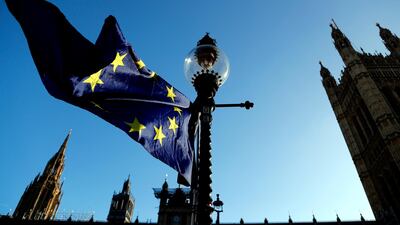British Prime Minister Theresa May faced the prospect of near certain defeat in parliament on Tuesday over a withdrawal deal from the European Union after a promised letter of clarification from Brussels fell flat with potential rebels.
Jean-Claude Juncker and Donald Tusk, the presidents of the European institutions, wrote to Mrs May clarifying that Brussels did not want to trap Britain in a customs deal that prioritised an open Irish border. The pair said the EU would commit to securing a new trade deal that rendered the so-called Irish backstop redundant by 2021 at the latest.
However the document fell short of the renegotiation that many rebels wanted and the Democratic Unionist Party, which holds the balance of power in the House of Commons, said it would vote against the government proposals.
"Despite a letter of supposed reassurance from the European Union, there are no “legally binding assurances” as the prime minister talked about in December. In fact, there is nothing new. Nothing has changed," said the DUP's deputy leader, Nigel Dodds. "Instead of meaningless letters, the prime minister should now ask for and deliver changes to the withdrawal agreement."
Before opening the penultimate day of debate on the deal, Mrs May issued a stark warning to Brexit-backing MPs on Monday, telling them the project was at risk if they don’t vote for her deal.
The prime minister made a speech to factory workers in the town of Stoke on Monday, telling them she expects MPs are more likely to block Brexit than for the UK to drop out of the EU without a deal.
Mrs May is facing a parliamentary defeat on the issue, with reports of up to 100 of her own MPs voting against her deal, as well as the opposition Labour party and the the DUP. With growing calls for a re-run of the 2016 referendum, Mrs May said failure to carry through Brexit would trigger an enormous political backlash.
"I ask [MPs] to consider the consequences of their actions on the faith of the British people in our democracy,” she said. "What if we found ourselves in a situation where Parliament tried to take the UK out of the EU in opposition to a remain vote?"
The comments form part of Mrs May’s last attempts to persuade Parliament to vote for her Brexit deal on Tuesday ahead of the 29th March deadline for the UK to leave. The vote was originally scheduled for December 11, but delayed until after Christmas as it became clear the prime minister may not get the votes needed to pass the divorce bill. Shortly after, Mrs May survived a vote of no-confidence by her own party.
“It’s now my judgment that a more likely outcome is a paralysis in Parliament that risks no Brexit," the prime minister said.
Liam Fox, a leading cabinet minister, said Mrs May had secured assurances from Brussels that the Irish border arrangement was purely a stopgap to be superseded in a long-term agreement.
A junior member of the Conservatives whips office, Gareth Johnson became the 13th member of the government to resign from office over the deal. He said he was putting country before party.
__________________
Read more:
No-deal Brexit preparations underway as 4000 civil servants quit day job
Britain is a rudderless ship with no real captain
Brexit on the brink as Theresa May resists demand for plan B
__________________
Opposition leader Jeremy Corbyn has committed his party to vote against Mrs May’s deal and instigate a parliamentary confidence vote. A successful vote of no confidence in this case would trigger a general election.
Some of the waverers have returned to the fold, fearful that the British exit could be derailed. "What worries me is that if she (the PM) loses by over 100 the EU might offer her nothing and the remainers might take control completely," said Sir Edward Leigh, a veteran campaigner against Europe.
Mrs May also warned against talk of a delay in the departure date. “We’re leaving on March 29. I’ve been clear that I don’t think we should be extending article 50 and I don’t believe we should be having a second referendum,” she said.
To minimise disruption in the event of a no-deal Brexit in March up to 4,000 civil servants in five of Britain’s government have been reassigned to work on the preparations for a hard exit.


